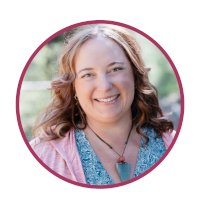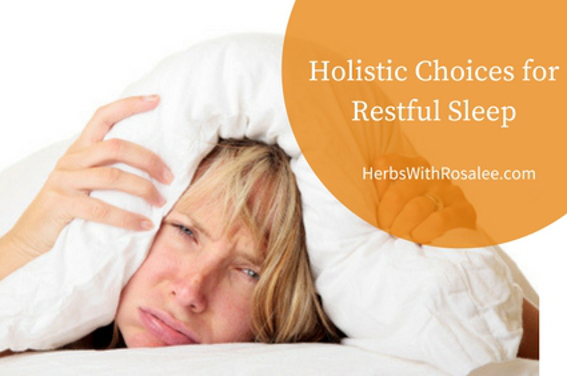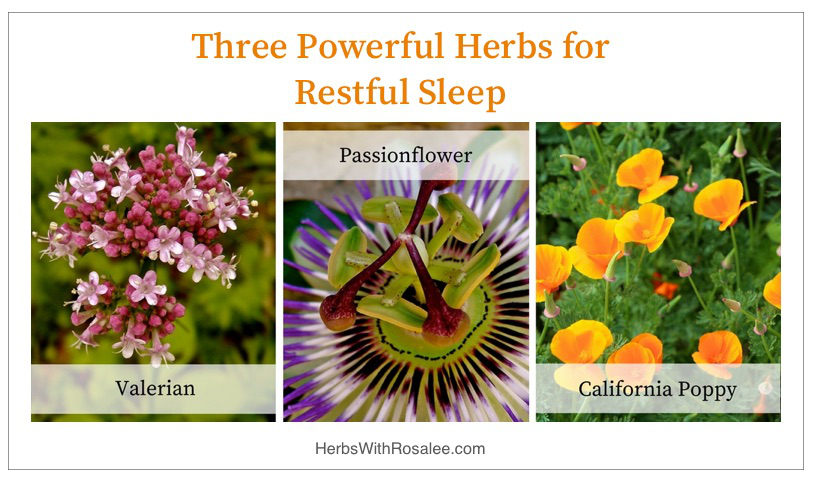Get weekly tips, recipes, and my Herbal Jumpstart e-course! Sign up for free today.

Natural Sleep Aids
Share this! |
|
Searching for natural sleep aids and insomnia relief?
I’ve worked with many people with chronic insomnia and my heart really goes out to those people who are unable to sleep. Insomnia symptoms often include extreme fatigue and the frustration of long sleepless nights followed again by extreme fatigue. Using home remedies for insomnia and some natural sleep aids can dramatically help you get the sleep you need!
This article explains what is insomnia and how to find insomnia relief using some natural sleep aids and home remedies for insomnia.
What is Insomnia?
Western medicine recognizes two types of insomnia: primary insomnia and secondary insomnia.
- Primary insomnia refers to people who don’t have a single known cause for their insomnia.
- Secondary insomnia refers to people who have a sleeping disorder because of pharmaceuticals or recreational drugs they are taking. In other words, it’s a side effect of something they are ingesting.
There is also chronic insomnia and acute insomnia.
- Chronic insomnia is a long-term sleeping disorder. A general definition for chronic insomnia is a person’s inability to get sufficient restful sleep even though they have the time and space for sleep. This means the person is most often laying in bed, wishing they were sleeping, as opposed to playing video games or reading the Twilight series all night.
- Acute insomnia is a short term sleep disorder. People with acute insomnia are described as having difficulty sleeping for a short period of time only. Some people present with chronic acute insomnia, meaning they have a week when they don’t sleep, followed by months of good sleep, followed by a week of no sleep.
Insomnia Remedies
Western medicine will often prescribe insomnia medications of various strength to people presenting with chronic insomnia. Since depression often exists alongside chronic insomnia, doctors often also prescribe medication for depression as well.
Holistic perspective on chronic insomnia
From a holistic perspective, chronic insomnia and acute insomnia are simply too general of terms for any one herb or supplement to effectively address it. First we have to look at underlying causes of insomnia, then we need to evaluate the individual’s specific manifestation of insomnia in order to find the best insomnia remedies.
First, here are some causes of insomnia:
- Emotional turmoil (stress, loss of loved one, job difficulties, financial difficulties, etc)
- Physical pain and discomfort
- Digestion irregularities
- Hypoglycemia
- Nutrient deficiencies
- Diet (food intolerances, caffeine intake)
- Poor sleep habits (watching TV in bed or too close to bed time, going to bed too late, exercising late at night)
- Light exposure (we sleep best in total darkness)
- Keeping irregular hours (shift work)
- Medications
- Temperature of the room
- Ambient noise (a snoring partner, a train running by outside)
- Restless leg syndrome
- Pregnancy insomnia
- Insomnia and menopause
Natural Sleep Aids: Holistic Treatment and Insomnia Remedies
When I work with a person who is having difficulty sleeping at night I always start by addressing any of the above causes they are experiencing. For example, eliminating someone’s third cup of coffee, adjusting the temperature of the room and creating a dark sleeping space can do wonders to deliver someone’s their zzzzzz’s. Just because most herbs for insomnia are safe or “natural” doesn’t mean they should be the first thing to reach for. When we do this we are simply using herbs like drugs and suppressing symptoms instead of addressing the underlying causes of insomnia.
Concurrently, I am also working with this person to understand how they specifically experience insomnia. Is it difficult to go to sleep? Or do they fall asleep right away only to wake up a few hours later? Do they fall asleep but wake up too early in the morning?
Furthermore, I am wanting to know who this person is. Do they tend to run hot or cold? Are they generally happy? angry? sad? How is their digestion? Do they get frequent colds and flu? What is going on in their life that may be contributing to this? There might be other special considerations such as pregnancy insomnia or insomnia and menopause.
Surprisingly, all the answers to these questions shed important light on what is the best sleep aid as well as which course of action will bring you insomnia relief.
Herbal Sleep Aid
Herbs for insomnia can bring safe and effective insomnia relief. Herbs are a non prescription sleep aid that are safe and effective. But truly, in my experience, there is no one herb for insomnia! The best sleep aid is when herbs are matched to the person and not when they are used to treat disease.
Here are herbal actions to consider for those presenting with insomnia.
- Cooling relaxing nervines
This herbal sleep aid category is for the person who tends to run hot. Perhaps their minds race at night with tomorrow’s to-do list. They generally have strong digestion and tend towards inflammation. Passion flower extract is a wonderful cooling relaxing nervine that can be a powerful natural sleep aid. - Warming and relaxing nervines
This herbal sleep aid category is for the person who tends to run cold. They may be more prone to low energy, or shorter bursts of high energy. Valeriana officinalis is a non prescription sleep aid that works really well for people needing more warming qualities. - Anti-spasmodic herbs
This herbal sleep aid category overlaps significantly with nervines. I consider this action more specifically if the person is experiencing restless legs at night (although the underlying cause also needs to be addressed) or if they have pain and muscle tension that prevents them from sleeping. Again, Valeriana officinalis really shines as an herbal sleep aid that is also anti-spasmodic. - Adaptogens
Adaptogens support a person’s vital functions. They can restore a person’s day and night cycle so that energy is felt during the sunlight hours and sleepiness is sought after in the nighttime hours. Adaptogens also help to modulate the negative effects of stress.
Lifestyle changes and home remedies for insomnia
- The best sleep aid can be lifestyle changes. Simply changing your sleep routine or being more active during the day can dramatically improve your sleep. Some other considerations include getting sunlight exposure early in the morning and keeping a sleep journal to record sleep patterns and thoughts. Relaxation therapies are helpful to teach a person how to enhance drowsiness at night.
- Epsom salt baths along with aromatherapy can help to induce sleep. This is especially wonderful for pregnancy insomnia. I generally recommend using a lot more epsom salts than is suggested on the carton.
- Insomnia can be a sign of magnesium deficiency. It is estimated that 80% of people in North America are magnesium deficient. Magnesium is one of the best natural sleep aids.
- If extreme fatigue during the day is a problem then energy enhancing supplements may be used to increase energy throughout the day, so that tiredness can be experienced at night. B complex and tyrosine are possibilities.
- Many people report that melatonin supplements are a helpful non prescription sleep aid. I do not recommend melatonin supplements because all melatonin is derived from a synthetic source. So while they are marketed as one of the natural insomnia cures, they simply aren’t natural. There are also negative side effects associated with melatonin supplements. I find that the best non prescription sleep aid are herbs, lifestyle changes and safer supplements.
- If a person wakes after only a couple hours of sleeping, especially if they wake hungry, then eating a protein snack closer to bed time may help. Also avoid sugary snacks and carbs in the evening. Food intolerances, caffeine consumption and alcohol consumption should all be evaluated.
Summary
Chronic insomnia can be a frustrating and debilitating health condition. Herbs for insomnia can be a safe and effective way to find insomnia relief. I hope this article on natural sleep aids and herbal sleep remedies will get you started on a good night’s sleep!

Rosalee is an herbalist and author of the bestselling book Alchemy of Herbs: Transform Everyday Ingredients Into Foods & Remedies That Healand co-author of the bestselling book Wild Remedies: How to Forage Healing Foods and Craft Your Own Herbal Medicine. She's a registered herbalist with the American Herbalist Guild and has taught thousands of students through her online courses. Read about how Rosalee went from having a terminal illness to being a bestselling author in her full story here.

